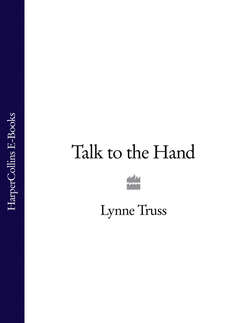Читать книгу Talk to the Hand - Lynne Truss - Страница 11
5 Booing the Judges
ОглавлениеThe timing was significant. Emerging, bruised and a bit horrified, from encounters with the uppity British public in the 2005 election campaign, the Prime Minister, Tony Blair, launched a campaign for the restoration of “respect”. “A bit late,” some of us muttered, when we heard. Respect was surely already a huge area for public concern. The humblest lip-reading TV viewer can spot a labio-dental fricative (or “F”) being formed on the lips of a footballer, with the result that when a permanently livid chap such as Wayne Rooney, with his veins sticking out on his neck, and his jug-ears burning with indignation, hurls seventeen assorted labio-dental fricatives at the referee, there is no interpreting this as, “Actually, it was a bit of a dive, sir, but now I’ve learned my lesson and I shan’t be doing it again.” Sport is supposed to be character-forming, but people are turning out like Wayne Rooney, and we are in deep trouble. Blaming the parents is an attractive option here, by the way. In 2002, the American research unit Public Agenda published Aggravating Circumstances: A Status Report on Rudeness in America, in which only 9 per cent of those questioned thought that children behaved respectfully towards adults, and 71 per cent reported seeing parents at sports events “screaming” at coaches, referees, and players.
Disrespect for older people; disrespect for professional people; disrespect for property – every day we are newly shocked at the prevalence of this kind of rudeness. Egalitarianism was a noble aim, as was enlightened parenting, but both have ploughed up a lot of worms. Authority is largely perceived as a kind of personal insult which must be challenged. On TV competitions, judges are booed and abused for saying, “Look, I’m sorry, he can’t dance!”, because it has become a modern tenet that success should have only a loose connection with merit, and that when “the people” speak, they are incontestably right. Meanwhile, old people are addressed by their first names, teachers are brusquely informed, “That’s none of your business!” by small children, judges are abused in court by mouthy teenagers, and it turns out that even if you’ve got the exact money, you can’t buy this jumper because Jason’s got the key to the till and he’s a muppet, he’s out the back at the moment, texting his girlfriend who’s just come back from Rhodes which was all right but she wouldn’t go again, she’s more of a Spain person, if you know what I mean, I like Spain, I’ve been there twelve times, but then I’m a bit of an iconoclast.
The most extreme form of non-deference, of course, is to be treated as actually absent or invisible. People talk across you on planes, or chat between themselves when they are serving customers. Nothing – nothing – makes me more angry than this. I get sarcastic. I wave in people’s faces. I say aloud, “I’m sure I’m standing here. Can you see me standing here? Why don’t you just catch my eye for a second to acknowledge that I am standing here?” For some time now, I have been carrying a Sooty glove-puppet on shopping expeditions, so that I can at least have a decent conversation when buying stuff in Ryman’s. “What’s that, Sooty? That will be £3.99? What’s that, Sooty? Thank you very much? What’s that, Sooty? Goodbye?”
